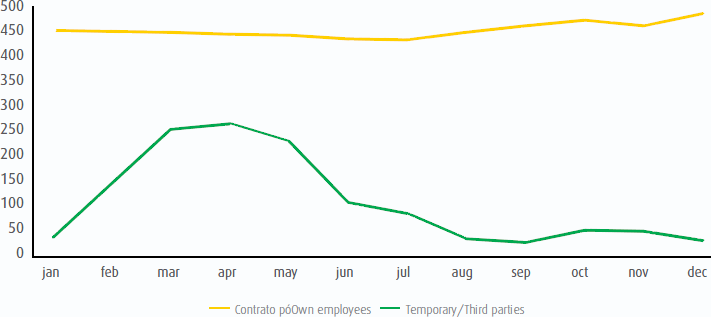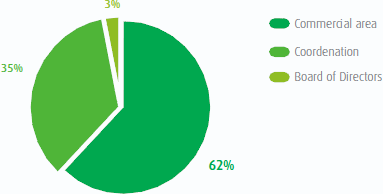Sustainability Report
All professionals working for Algar Agro are called “associates” – (defined as “connected by common interest to one or more people, the same as partner”) – as is the case in other companies in Grupo Algar. The word reflects the concept of network-enterprise adopted by the group, which stimulates commitment and autonomy with responsibility, which allows associates to participate in the decision-making process.
Recognizing the importance of each professional for the sustainable growth of the business, the Company is committed to education, life quality and human and professional development. Based on its values and beliefs, the Company’s Human Talent policy strives for professional qualifications for associates, a pleasant work environment and atractive remuneration and career developmet policies. This way associates will feel proud and motivated to be part of Algar Agro. Another aspect of policy is the incentive to diversity: special needs and retired people are becoming a bigger part of the team.
Profile of Associates
At the end of 2011 Algar Agro had 464 associates, of which 315 in the Southeast Region where the Uberlândia unit is located, as well as the head office; 126 in the Northeast in the Porto Franco unit; and another 22 in the Center-West region, linked to soybean origination and warehousing activities. Personnel turnover was around 2% overall.
Given the nature of the business, most associates are men (87.1%) and over half (51.5%) aged over 35. Women, which account for 12.9% of total, almost all work in administration. Agewise, 24.8% are under 30, 53.7% are aged between 31 and 50 and 21.5% are over 50. 45% of associates have secondary level education, while university level and post-graduates account for 22.8% and 5.2%.
Outsourced LabourAlgar Agro due to the nature of its business, employs outsourced labour throughout the year. At the end of 2011 there were 57 employees which were either temporary or outsourced.
Correlation between own employees and outsourced ones

Turnover Rates
Turnover rate in 2011 was of 2.1% for own employees and 100% for short contract or temporary employees, as shown below:
| Own Employees (at 31/dec) | Outsourced (at 31/dec) | |||||||
|---|---|---|---|---|---|---|---|---|
| Permanent or indeterminate contract | Fixed or Temp contract | Permanent oursourced contract | Temporary outsourced contracts | |||||
| Total Left Company |
% | Total Left Company |
% | Total Left Company |
% | Total Left Company |
% | |
| Gender | ||||||||
Male |
91 | 87.5% | 0 | 0.0% | 0 | 0.0% | 254 | 91% |
Female |
13 | 12.5% | 0 | 0.0% | 0 | 0.0% | 25 | 9% |
Total |
104 | 100% | 0 | 0.0% | 0 | 0.0% | 279 | 100% |
| Age | ||||||||
> 50 |
10 | 9.6% | 0 | 0.0% | 0 | 0.0% | 0 | 0% |
30 to 50 |
46 | 44.2% | 0 | 0.0% | 0 | 0.0% | 279 | 100% |
< 30 |
48 | 46.2% | 0 | 0.0% | 0 | 0.0% | 0 | 0% |
Total |
104 | 100% | 0 | 0.0% | 0 | 0.0% | 279 | 100% |
Relations with internal public
Training and Qualification
In line with its policy of promoting internal talents, Algar Agro every year has invested more time and money in training. In 2011, R$ 396.6 thousand were invested in 9171 hours of training for 370 associates, with an average of 24.79 hours of training per associate. Most of the training is done through UniAlgar, but when necessay the Company send their associates to well-known institutions, congresses, fairs and other events, in order to acquire technical and specific work skills.
Training Hours 2011
Total – 8.901 hours
Integration courses, which disseminate the company culture, and other qualifying programs, are part of the scope of the corporate university of Grupo Algar, called UniAlgar, created in 1988 to complement traditional education, focussing on essencial business skills. All UniAlgar iniciatives, programs and projects are developed to increase individual or team performance, and have a positive impact on the sustainability of the Company. As well as face-to-face training, UniAlgar uses on-line training, chats, forums, content hot-sites and social networks to promote learning. In 2011, 48 associates were trained on a distance learning platform.
Programs to develop leadership qualities exist at several levels. Avan is a management refresher plan targeted at senior executives. The ‘Talents in Development’ program is aimed at associates not yet in a management function. For the development of supervisors, there is the ‘Mid-level Leadership Program’ tailored to the characteristics of the Company and to the challenges of the function.
The Young Entrepreneur Program deserves mention amongst the new programs developed in 2011. It is a trainee program designed to attract, develop and retain young talent to work in the Company. Around 3000 graduates applied; after a selection program the first seven trainees will start work in 2012.
Health and Well being
UniAlgar also develops programs to improve well being and quality of life of associates. Since 2002 all executives of Grupo Algar have participated in the “PDI da Saude” program. After clinical, physical and nutricional evaluation, these professionals receive orientation and constant motivation to fight sedentarism, obesity, stress and other factors which affect life quality.
As further incentive, those who reach their targets gain career points which are subsequently used to calculate the annual bonus. Periodic surveys confirm the success of the program year after year. At year end 2011, 100% of Algar Agro’s executives were considered physically active. The success of the ‘PDI da Saude’ plan has led Grupo Algar to extend the program to all associates in 2012.
Still focussing on health, well being and safety, Algar Agro has a Corporate Health and Safety Committee. Headquartered in Uberlândia/MG, and meeting every two months, the committee organizes activities such as the Ecological Walk, which in 2011 involved associates and their families. In the past 3 years, 75% of associates were represented by this committee. Algar Agro also maintains committees as legislated under Cipa and SESMT legislation which represent all workers.
Smaller events of different nature were organized throughout the year at different locations. At Balsas and Porto Franco, both in the state of Maranhão, the Company organised the June Fair. At the Fazenda Canadá, in Uberlândia/MG, the football ground was revamped, with new goalposts, nets and lighting. Also in the farms, all accomodations were upgraded to suit the needs of associates.
Regarding corporate health and quality of life, the Diálogo da Semana de Segurança plan included all Results Centers, with participation of leaders, safety technicians and industrial teams. In all, there were 38 meetings on diverse themes. All these actions contribute positively to the work climate withing the Company.
Career Management
Algar Agro’s Human Talents policy is a meritocracy based on fairness, and there is no salary differential between the sexes. It also offers a clear career path which allows associates to set targets needed to realize their objectives. In 2011 the lowest monthy salary paid by the company was of R$ 588.70, corresponding to 1.08 times the minimum salary.
The Company maintains good relations with Labor unions – in 2011, 94% of associates were covered by collective bargain agreements. Managers in executive functions are not covered by such agreements as they have specific remuneration packages. In April 2011 Algar Agro distributed R$ 2.6 million in bonusses which referred to the previous year. For 2011 a new bonus policy is being implemented with new objectives and covering a larger number of associates.
One of the Company’s career management tools is an evaluation to measure the quality of associates’ work. This is applied to all associates of Grupo Algar, which benefit from more objective development plans. This review is applied formally at least once a year. In 2009 and 2010, 65% and 78% of associates had career reviews. In 2011, 445 associates were reviewed, 96% of the total.
Another policy of the Human Talents area is to seek internally qualified people to fill new positions within the company, before opening up the positions in the work market. In 2011, UniAlgar’s development programs contributed to the promotion of 25 associates of Algar Agro.
top